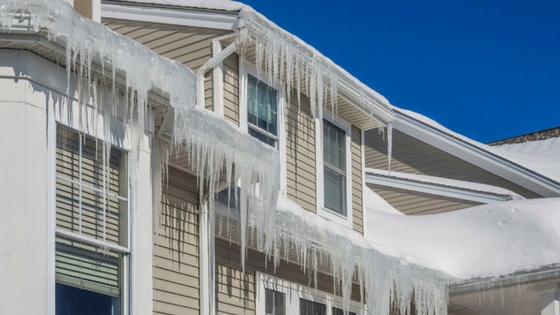Should You Do Roof Repairs in Winter?
While it may seem more practical to do your roof repairs prior to the harsh winter, sometimes a leak or damage requires a repair in the dead of winter. You may be wondering if you can have roof repairs done in these icy, snowy conditions, but other than some limitations on materials, there’s no reason that you can’t get a roof repair in winter.
There are also times when it’s better to repair your roof in the winter. When you have a minor leak in your roof, constant snow or rain can compromise the structural integrity of your roof and leave it susceptible to more damage.
Will a Roofing Contractor Work in the Winter?
Absolutely! It’s typically ill-advised for you to try to do your own roof repairs in the winter, but residential roofing contractors have the necessary training to work safely in these conditions. Some contractors may even prefer it since the hot summer months present additional challenges and roof temperatures can reach dangerous levels.
Understanding Winter Roof Repair and Replacement
Now that you know that residential roofing contractors will repair your roof in the winter, what are the other concerns?
Roofing materials behave differently when the temperatures are below 40 degrees. This isn’t a concern for some materials, which can be installed year-round, but other materials can’t be installed in these severe conditions.
Let’s take a look at some of these special circumstances.
Flat Roofs
Repairing and installing flat roofs present some challenges in winter, but PVC (polyvinyl chloride) and TPO (thermoplastic olefin) materials can be installed in the winter. These are single-ply, thermoplastic roofing products that are mechanically installed and hot air welded, as opposed to secured with adhesive.
Rubber roofs, however, can’t be installed under 40 degrees because the adhesive will freeze instead of bonding. This is according to the manufacturer suggestions, so if a roofing contractor says that they will install or repair a rubber roof in winter, there’s cause for concern. Ignoring this suggestion can result in voided warranties and roof leaks, which won’t help you in the long run.
Sloped Roofs
Asphalt shingles are used for most sloped roofs and can be installed in the winter. That said, you’ll need an experienced roofing contractor who knows how to work with this material in cold conditions since they become much easier to break. They also rely on a proper seal in the overlap to work effectively, which requires heat to bond. Because of this, asphalt shingles won’t seal until the spring and are susceptible to leaks.
Metal Roofs
Metal is the one material that isn’t compromised by cold weather. They won’t crack or break from the cold, and they’re designed to expand and contract, so the freezing and unfreezing process won’t affect them.
Get a Quote from Orange Roofing
As you can see, winter roofing projects can be done properly in the winter, provided you get a roofing contractor with the necessary experience and knowledge.
Regardless of the season, you should always seek out a professional and licensed roofing contractor for your roof repairs and installation, such as Orange Roofing. We’re here for all your roofing needs, so call us today to get a free quote on your roof repair or installation!




Leave a Reply
Want to join the discussion?Feel free to contribute!